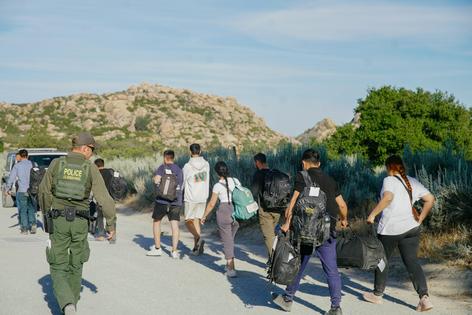How Trump might target DACA recipients and other immigrant groups
Published in Political News
Donald Trump has promised voters that he would carry out a range of immigration actions, including deporting, with the help of the National Guard or military, millions of immigrants living illegally in the U.S.
Many of Trump’s plans do not require congressional approval, but they still might be hard to undertake at a scale that Trump has described.
Amy Lieberman, a politics editor at The Conversation U.S., asked University of Southern California immigration law scholar Jean Lantz Reisz to explain how Trump could follow through on some of his immigration promises during his second administration – and what legal and political obstacles he could encounter along the way.
What role do states play in any Trump order to deport immigrants?
There are 11 million people living without legal authorization in the U.S., and Trump would have the authority, as president, to deport those people. But it would be very expensive to pay for the immigration officers, immigration judges, detention facilities, the plane flights and more that would be required to do so. Estimates on the cost of mass deportation range from US$88 billion a year to more than $300 billion.
The administration is probably going to have to rely on state and local governments to help carry out these deportations. The president cannot legally force state and local governments to cooperate with immigration enforcement. About 10 states, including New York, Massachusetts and California, have laws that prohibit cooperation with Immigration and Customs Enforcement, or ICE – the federal agency that oversees immigration and deportation – under certain circumstances.
For example, in California, employers may not allow ICE to enter nonpublic areas of their workplace without a proper warrant. Other states also prohibit law enforcement from sharing the immigration status of certain low-level criminal offenders.
The federal government could give more money to a state in order to help it cooperate with federal immigration efforts, and take it away if they do not cooperate. But federal case law says that the president does not have the authority to withhold federal money to coerce a state into cooperating with immigration actions.
Could Trump still send federal immigration officers to a state that does not cooperate, in order to identify and detain immigrants?
States could not prevent the federal government from coming in to arrest and deport people – but they don’t have to help them, and could set up some obstacles. The federal government would have to provide all of its own personnel. Texas and Arizona have recently approved laws that require local law enforcement to cooperate with the Department of Homeland Security and enforce immigration law.
The Department of Homeland Security has the authority to deputize and train local law enforcement to enforce immigration law.
ICE could rely on local sheriffs or police in some states, like Texas, to identify and arrest immigrants and turn them over to ICE to deport. In other states, like Oregon and Illinois, that want to protect immigrants from deportation, they can refuse to cooperate with federal authorities by not providing certain personal information on immigrants.
What are the other risks immigrants might be concerned about?
There are about 580,000 people who are living in the U.S. and are part of the Deferred Action for Childhood Arrivals, or DACA, program. DACA gives some people who came to the U.S. illegally as children the right to legally work, go to school and live in the country. The courts have already litigated that a president can lawfully terminate DACA through a certain process.
Currently, President Joe Biden is defending DACA by appealing a Texas district court decision that DACA is an unlawful program. Once in office, Trump can instruct the Justice Department to dismiss the appeal, effectively ending DACA.
People who apply for DACA have to state in their application that they are in the country unlawfully. So the government could prove that DACA recipients can legally be deported, and will have information on where they live.
The next group of immigrants that could be targeted is people from Afghanistan and other countries who have humanitarian parole, which is temporary permission to remain in the U.S. legally. Trump can end all of the parole programs, including those for Ukrainians.
In addition, Trump can end Temporary Protected Status, a law that gives temporary permission to some people to legally stay in the U.S. for up to two years because of an emergency situation in their countries. He tried to do this, but was unsuccessful, during his first administration because he didn’t follow the right legal process. About 1.2 million people are covered under this program, which Biden expanded.
Trump has said he would end birthright citizenship, which is the right for any person born in the country to get citizenship. Could he legally do this?
The Trump administration could order federal officials to stop processing passports and Social Security numbers for people who cannot establish that their parents are U.S. citizens. An ensuing lawsuit, probably brought by individuals denied their documents, would force courts to weigh in on birthright citizenship.
The Fourteenth Amendment gives the right of citizenship to all people born in the U.S. regardless of their parents’ nationality. Challengers to birthright citizenship argue that the Fourteenth Amendment should be reinterpreted to exclude people who were born in the U.S. to parents who are present unlawfully and therefore without the consent of the U.S. government.
To succeed in overturning birthright citizenship, the Supreme Court would have to reverse a 126-year-old precedent, which states that anyone who is born on U.S. soil and not the child of someone engaged in diplomatic service is a U.S. citizen.
Trump has talked about using the Alien Enemies Act as a way to deport people. What does this mean?
Trump has talked about using the Alien Enemies Act of 1798 as a way to get around judicial review and immigration courts and deport people such as gang members and cartel members. This law allows a president, during a time of war, to detain and deport people born in an enemy nation.
One problem with this is that Trump won’t have the authority to deport people under this act, unless there is a war with or invasion by another nation or government. Gangs or cartels are not their own nation or government. For example, Trump could not simultaneously recognize the Mexican government and a cartel also as the government of Mexico – or succeed in legally proving the Mexican government is sending cartel members to invade the U.S. on behalf of the Mexican government.
Another problem Trump would have in using the Alien Enemies Act is that it allows for review by the courts to determine whether an individual is actually an “enemy alien.” It would not likely provide an automatic shortcut to deportation and would end up in litigation.
This article is republished from The Conversation, a nonprofit, independent news organization bringing you facts and trustworthy analysis to help you make sense of our complex world. It was written by: Jean Lantz Reisz, University of Southern California
Read more:
On the US-Mexico border, the records of Trump and Harris reflect the national mood of less immigration, not more
How Trump’s racist talk of immigrant ‘bad genes’ echoes some of the last century’s darkest ideas about eugenics
Beefing up Border Patrol is a bipartisan goal, but the agency has a troubled history of violence and impunity
Jean Lantz Reisz does not work for, consult, own shares in or receive funding from any company or organization that would benefit from this article, and has disclosed no relevant affiliations beyond their academic appointment.


































































Comments